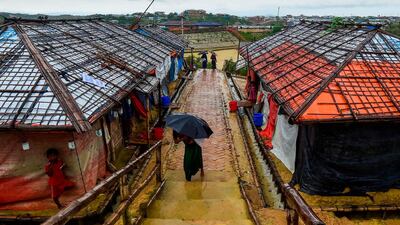Standing among crowded bamboo shacks in the middle of the world’s most populous refugee camp, Mohamed Eleyas lists the guarantees the Rohingya want met before they will return home to Myanmar.
“We have always told [the Myanmar government] that we need full citizenship as members of the Rohingya ethnic group, a safe zone with guaranteed international security, reparations for loss of property and land, and equal rights that are shared by other ethnic groups in Myanmar before we repatriate,” said Mr Eleyas, a Rohingya refugee and senior member of the camp-based community service organisation Arakan Rohingya Society for Peace and Human Rights.
But two years since over 740,000 mostly Muslim ethnic Rohingya fled state-led violence in Myanmar, these demands remain unmet, leaving the Rohingya unwilling to leave the sprawling refugee camps near the Myanmar border in southern Bangladesh. The apparent reluctance of the Myanmar government to facilitate their return is raising fears the Rohingya in Bangladesh will remain stateless for generations.
"We've made our needs and demands clear so many times and they still do not help us," Mr Eleyas told The National. "They need to guarantee the rights we ask for before we can even consider repatriation," he said.
The Rohingya are an ethnic minority who have lived in Myanmar’s Rakhine State for generations. A predominantly Muslim minority, the Rohingya have faced state-led violence and persecution in Buddhist-majority Myanmar for decades.
Two years ago they were forced to flee into neighbouring Bangladesh. Myanmar's military acted with "genocidal intent" during "clearance operations", a United Nations Fact-Finding Mission found. After the Rohingya fled, many of their villages were burned and bulldozed.
Since then the Rohingya have demanded to return home but the Myanmar government’s efforts have failed to convince them it is safe to return. A recent push for repatriation in which the Myanmar government drew up a list of 3,450 people cleared for return resulted in zero Rohingya volunteering for repatriation.
Among the reasons why no one volunteered, the Rohingya say, is that the Myanmar government is still unwilling to offer a clear path to full citizenship.
Instead, the government has offered Rohingya National Verification Cards (NVCs). These would act as placeholder identification while the government determines eligibility for National Registration Cards (NRCs), the traditional identification document that verifies people as full citizens of Myanmar.
The Rohingya say an NVC is not enough.
”We call the NVCs ‘genocide cards’,” said Mr Eleyas. “We were born [in Myanmar] and even our grandparents were born there, so why should we accept the NVC cards? We will not agree to them. If we do, [the Myanmar government] will just label us as ‘foreigners.’”
Without a NRC, those returning will lack full citizenship, leading to restricted freedom of movement, and limited access to education, public services, and jobs.
To obtain a NRC, people must show evidence of a family’s citizenship dating back generations, something most Rohingya say is nearly impossible, given the long-running state discrimination against them.
“We have deliberately been left with no documentation,” said Metun, a Rohingya refugee at the Kutupalong camp. Like many Rohingya he uses only one name.
“When they burned the villages, what remaining documentation people had was burned too….This is why people are not willing to go back. If we go back, we will be forced to go through the NVC process, be forced to apply for citizenship. It’s like putting your legs in the fire.”
While the government of over-populated Bangladesh is eager for the Rohingya to return, Myanmar authorities appear less than sincere in repatriation efforts, often blaming its neighbour for delays.
"The Myanmar side had repeatedly requested the Bangladesh side to follow the procedures set out in the bilateral agreement," said a statement in the government-owned Global New Light of Myanmar, referring to verification forms meant to be distributed to Rohingya refugees seeking repatriation. "This procedure was not adhered to."
For those who do return, the government has provided little information about what will happen after they are taken to barbed-wire enclosed “reception centres” in Rakhine state.
The possibility of Rohingya returning to their previous homes seems unlikely, as the government appears to be razing Rohinya villages anew.
Analysing satellite imagery, the International Cyber Policy Centre at the Australian Strategic Policy Institute reported that nearly 60 Rohingya settlements were demolished last year, with destruction continuing this year. The report also stated that six military facilities have been built or expanded on former Rohingya settlements.
“They bombed and burned our homes while we were fleeing,” said Mr Eleyas. “We want to go back to our land, but we know there is nothing there anymore.”
The safety of those returning also remains a concern.
Rakhine remains an active conflict zone, with aid groups and journalists largely denied access to the region. A government-led telecommunications blackout has been in effect in nine townships since June 21. According to Human Rights Watch, an estimated 500,000 Rohingya that remain in Rakhine are confined to camps without access to livelihoods, adequate food, medical care, education or freedom of movement.
And the same security forces that committed violence against the Rohingya would be providing security to those who repatriate, something the Rohingya are unwilling to accept.
"The military is like a crocodile, and we have seen them eat and destroy our people for generations,” said Mr Eleyas. “We do not trust them to protect us.”
With Myanmar authorities giving little sign they mean to regain that trust, it seems likely the Rohingya will remain in exile for the foreseeable future.
“We want to go home as quick as possible, but to do that we have to be able to do it with all our rights,” Mr Eleyas said. “Only then will be able to repatriate.”

